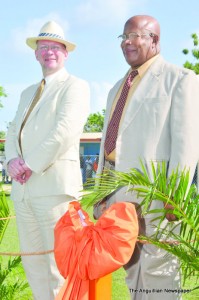
Anguilla’s Chief Minister, Hubert Hughes, has invited the Caribbean Community (CARICOM) to send a delegation to Anguilla, telling the Heads of Government that he has a number of complaints against Governor Alistair Harrison. Mr. Hughes, who attended the March 8-9 Inter-sessional CARICOM Summit in Paramaribo, Suriname, succeeded in getting the regional leaders to accept his invitation.
As part of their communiqué, the CARICOM leaders stated that they would send a delegation to Anguilla “at the earliest opportunity” in a bid to defuse the “public tension” between the Governor and the Chief Minister.
Commenting on the “prevailing situation where public tensions between the Governor and the Chief Minister persist,” the regional leaders said: “Heads of Government expressed their grave concern at the continuing deterioration in the governance arrangements in Anguilla and expressed the firm view that, at all times, the best interests of the people of Anguilla must be paramount, including due respect for the duly-elected government.
“In this regard, Heads of Government called upon Anguilla’s leaders to safeguard public confidence in political leadership through constructive and objective discourse and reiterated the Caribbean Community’s readiness to contribute to an abatement of the ongoing tensions.”
Chief Minister Hughes, who left Suriname for Barbados, after the CARICOM Summit, gave an interview to the Caribbean Media Corporation (CMC) in Bridgetown. That organisation said, in a news report on Tuesday, March 13, that “long-running tensions between Chief Minister Hughes and Governor Harrison were no closer to being settled.” Mr. Hughes was quoted as telling CMC that the current situation “is untenable with Anguillians suffering.”
CMC said that Mr. Hughes charged that the Governor, backed by the British Foreign and Commonwealth Office, “is working to undermine his administration”. He claimed that “the Governor has been blocking critical investment and assistance which is crippling the economy.”
Mr. Hughes told CMC that the CARICOM mission, set for early April, would include Antigua and Barbuda’s Prime Minister, Baldwinn Spencer; Prime Minister Roosevelt Skerritt of Dominica; and the Prime Minister of St. Kitts-Nevis, Dr. Denzil Douglas. He said he was not asking them “to come to Anguilla to [speak] “with the Governor, at all, because the Governor is incredulous – we get no reason out of him.” Hughes went on: “We are inviting that team to Anguilla to speak to the Anguillian community. I intend to organise a major rally in Anguilla and I will have those Prime Ministers to speak at that rally to the Anguillian community – because what we want to do is to send a clear message back to London that we are not alone, and Anguilla will not be another Turks and Caicos in this part of the world. We have the support of the Caribbean leaders with us. This message we want to send to London.”
Just in case the Prime Ministers may want to see the Governor, as CARICOM indicated that the delegation would, Governor Harrison told The Anguillian: “I have heard about the plans for a CARICOM delegation to visit the island at the invitation of the Chief Minister. I look forward to meeting them, as I did a CARICOM delegation that visited in 2010, and to have discussions with them. I enjoyed meeting the previous CARICOM delegation, and I would find it useful, as I am sure would others, to see the report of the previous delegation’s visit in order to prepare for the next one.”
CMC stated that Mr. Hughes said he “had no personal vendetta against the British Governor but “was simply frustrated and disappointed by how the Overseas Territory was being treated by Britain.” He added that “his Government is now undertaking a constitutional exercise to achieve full internal self-government. Hughes says if this fails, he will pursue independence.”
Mr. Hughes further told CMC: “If you look at the situation around us, you will understand how archaic this colonial thing is. In St. Maarten, next door, you have the Dutch just approving a new constitution for Curacao and St. Maarten. St. Maarten has a Prime Minister and a Council of Ministers, democratically elected, and they have their own Governor – chosen by them – a local man. You go to the United States Virgin Islands, just to the west of the British Virgin Islands, the Governor is voted for in a democratic way. He is local and he has to go to the polls. So if he doesn’t do a good job, he can be removed by the electorate.
“We [in Anguilla] still have the imposition of Buccaneer-style Governors in this part of the world, in the Caribbean today. It is a disgrace and we have to do something about it.”
Meanwhile, in an earlier report relating to the Chief Minister’s invitation to CARICOM to send a delegation to Anguilla, he was quoted by other sources as having told delegates during the Overseas Territories Conference in London last November that “the Governor of Anguilla is a virtual dictator and that he manipulates every system… to suit his whim and fancy.”
Mr. Hughes was further quoted as saying that “the Governor undermines the economy of Anguilla, but there is a conspiracy with the Foreign and Commonwealth Office to m ake sure that Anguilla does not have a foreign economy.
“My only way of sending that message is civil disobedience in Anguilla, and this is what we will conduct until the British Government gets that message, because there is no way that they will come to Anguilla and create a Turks and Caicos here.”








